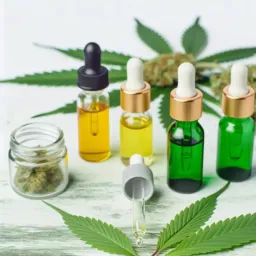Cannabis and Mental Health Insights
With over 40% of U.S. adults having tried cannabis at least once, the conversation around its effects, particularly on mental health, is more relevant than ever. As cannabis gains acceptance, understanding its complex components is crucial for informed decisions.
What You Will Learn
- Distinction between THC and CBD: THC is psychoactive and can induce a "high," while CBD is non-psychoactive and may offer therapeutic benefits.
- The role of lesser-known cannabinoids like CBG and CBN in influencing mood and emotional well-being.
- Current trends show that approximately 18% of adults use cannabis regularly, with nearly 50% of college students having tried it in the past year.
- Research indicates that THC may exacerbate psychotic disorders in predisposed individuals, while CBD shows promise in alleviating anxiety and depression symptoms.
- Individual responses to cannabis vary greatly due to personal history, mental health status, and genetic factors, highlighting the need for tailored approaches.
Understanding Cannabis and Its Components
Defining Cannabis and Its Active Compounds
Cannabis is a plant that has been used for centuries for various purposes, from medicinal to recreational. It contains many compounds known as cannabinoids, which are responsible for its effects on the body and mind. The two most well-known cannabinoids are THC (tetrahydrocannabinol) and CBD (cannabidiol), each playing a unique role in how cannabis interacts with our mental health.
Overview of THC and CBD
THC is the psychoactive compound that creates the feeling of being "high," often associated with relaxation and euphoria. In contrast, CBD does not produce these effects and is known for its potential therapeutic benefits, particularly in managing anxiety and stress. Understanding the differences between THC and CBD is crucial for anyone considering cannabis for mental health purposes.
The Role of Other Cannabinoids
Aside from THC and CBD, cannabis contains other cannabinoids like CBG (cannabigerol) and CBN (cannabinol), which may also influence mental health. Each cannabinoid interacts differently with the body's endocannabinoid system, potentially affecting mood and emotional well-being. This complex interaction highlights the need for further research into how these lesser-known compounds contribute to the overall effects of cannabis.
The Prevalence of Cannabis Use
The use of cannabis has significantly increased in recent years, with many individuals turning to it for various reasons. According to recent statistics, over 40% of adults in the U.S. have tried cannabis at least once, showcasing its widespread acceptance. This rising trend has sparked interest in understanding how cannabis affects our mental health.
Statistics on Cannabis Consumption
- Approximately 18% of adults reported using cannabis regularly.
- Nearly 50% of college students have used cannabis in the past year.
- Legalization in various states has led to increased access and use.
Reasons for Increasing Popularity
Several factors contribute to the growing popularity of cannabis. First, the increasing legalization across many regions has made it more accessible. Additionally, many people are seeking alternative methods for managing stress, anxiety, and other mental health issues, leading them to explore cannabis as a potential solution.
Take a deep dive into our article on Understand cbd chronic pain management. This comprehensive guide will provide you with all the information you need to understand this subject better.
Did You Know?
Research has shown that 70% of users report improved mental health after using CBD, while 30% mentioned adverse effects primarily related to THC. Understanding these statistics can help individuals make informed choices when considering cannabis for mental health support.
Research Insights on Cannabis and Mental Health
Current Studies and Findings
Key Research on THC and Mental Illness
Research shows a mixed picture of how THC, the psychoactive component of cannabis, affects mental health. Some studies indicate that high doses may trigger or worsen psychotic disorders, especially in individuals predisposed to such conditions. Yet, other research highlights that, for some, THC might provide temporary relief from symptoms like anxiety and stress.
Find out everything you need to know about All about cannabis benefits cancer patients in our detailed article. It's a valuable resource for anyone looking to learn more.
Find out everything you need to know about A closer look at cbd strains anxiety in our detailed article. It's a valuable resource for anyone looking to learn more.
Impact of CBD on Anxiety and Depression
CBD, another major cannabinoid, is gaining attention for its potential benefits in treating mental health issues. Studies suggest that CBD may help reduce anxiety and depression symptoms without the intoxicating effects associated with THC. It's exciting to consider that CBD could be a safer alternative for those hesitant about using cannabis for mental health concerns.
Our in-depth coverage on Explore cannabis consumption methods provides a wealth of information and insights. Be sure to check it out for a comprehensive understanding of the topic.
Understanding Individual Variability in Responses
Factors Influencing Mental Health Outcomes
Not everyone responds the same way to cannabis, which is important to keep in mind. Individual factors such as personal history, mental health status, and even tolerance levels can shape how one experiences cannabis use. This variability means that what works for one person might not necessarily work for another, highlighting the need for personalized approaches.
Genetic and Environmental Considerations
Genetics and environment play a significant role in how cannabis affects mental health. Certain genetic markers might make individuals more susceptible to adverse effects from THC, while others could benefit from its uses. Additionally, factors like stress levels, social surroundings, and prior experiences with cannabis can greatly influence a person's reaction to it.
Recap of Key Points
Here is a quick recap of the important points discussed in the article:
- Cannabis contains cannabinoids, with THC and CBD being the most prominent compounds affecting mental health.
- THC may induce psychoactive effects, while CBD is recognized for its potential therapeutic benefits in managing anxiety and stress.
- Cannabis use has become increasingly popular, particularly among adults and college students, largely due to legalization and a search for alternative stress relief methods.
- Research indicates mixed outcomes for THC regarding mental health, while CBD shows promise in alleviating anxiety and depression symptoms.
- Individual responses to cannabis can vary greatly due to personal history, mental health status, and genetic factors.
Practical Tips for Cannabis Use and Mental Health
- Consult a healthcare professional before starting any cannabis regimen, especially if you have a history of mental health issues.
- Consider starting with CBD products if you are hesitant about psychoactive effects; they may offer therapeutic benefits without the "high."
- Be aware of your personal tolerance and mental health status, and adjust cannabis use accordingly.
- Keep track of your experiences with cannabis to identify what works best for your mental health needs.
- Stay informed about the legal status and quality of cannabis products in your area to ensure safe and responsible use.
Frequently Asked Questions (FAQs)
- What is the difference between THC and CBD?
THC is psychoactive and induces a "high," while CBD is non-psychoactive and may provide therapeutic benefits. - How prevalent is cannabis use among U.S. adults?
Over 40% of U.S. adults have tried cannabis at least once, with approximately 18% using it regularly. - Can THC worsen mental health conditions?
Research indicates that THC may exacerbate psychotic disorders in predisposed individuals. - What are the potential benefits of CBD?
CBD is recognized for its potential to alleviate symptoms of anxiety and depression without the intoxicating effects of THC. - Why do individual responses to cannabis vary?
Responses can vary due to personal history, mental health status, genetic factors, and tolerance levels.
Latest Posts
Consumption
Health Benefits
Strains
Consumption






